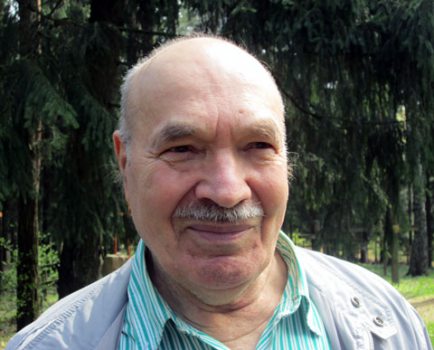Mikhail Kukabaka: History rewritten under dictation of another vozhd Putin
Mikhail Kukabaka, former inmate of Soviet labor camps, shared with Viasna his opinion about the destruction of the only museum to the victims of repression “Perm-36”.
Criticism over the Memorial Center of the History of Political Repression “Perm-36”, created in the 1990s on the site of a Soviet maximum security camp, erupted early this year, after the government of the Perm Krai stopped paying utility bills and the head of the regional Ministry of Culture dismissed the director of the museum Tatiana Kursina, while the media kept publishing mutual recriminations of the regional authorities and human rights activists. In July, activists of a nonprofit organization "Perm-36" reported the destruction of part of the exhibition, and accused the new leader of the museum of putting pressure on the organization. “The fact that until recently has been implied, discussed in the lobbies, what has been hinted at is now obvious: the exhibition, education and humanitarian projects developed on the basis of the Museum "Perm-36" are no longer needed by the Perm Region Administration,” said a statement on the website of the museum. “Moreover, the museum in the form in which it was created by the public is also not needed.”
The regional branch of the human rights organization "Memorial" appealed to the governor of the Perm Krai in an open letter, which expressed outrage at the fact that the museum closed for visitors is opened by the authorities to shoot provocative stories on NTV, which sling mud at the creators of the memorial. “Of especial outrage is the fact that the tour for television provocateurs was entrusted to former wardens of the colony, as well as representatives of the notorious movement “Essence of Time”. The TV story aired on NTV endlessly repeated the neo-Stalinist idea that the camp allegedly held solely Bandera supporters and accomplices of the Nazis. By saying this they suggested the museum itself was based on pro-Nazi and anti-state ideology,” wrote defenders of “Memorial”. They reminded the authorities that “the exhibition and museum tour guides tell about more than 50 % of prisoners of colonies in Perm (Perm-35 Perm-36, Perm-37), who in the 1970s-1980s were persecuted on political grounds. In addition, a large part of the museum is dedicated to the memory of the victims of earlier repression of the Stalinist period”. “Both were rehabilitated as victims of illegal political repression, reinstated under Russian law and legislation of the countries that were part of the USSR. These facts cannot be denied even by the inveterate opponents of the museum. They can only hide it, which means intentionally misleading the public,” noted the defenders.
Very soon, the whole story got received international publicity and the destruction of the museum was condemned by former Gulag prisoners from other post-Soviet countries. In particular, in early August, demands to stop the destruction of the museum, the “historical memory, which shows and always will testify about the crimes of the twentieth century”, were voiced by former political prisoners, their relatives, researchers, journalists, and human rights activists from Ukraine. Then the representatives of non-governmental organizations from Russia and the European Union urged the authorities to rescue the memorial, which on August 15 was reported by the website of the Presidential Council on the development of civil society and human rights. As stated in this message, Russian President Vladimir Putin also expressed concern over the situation around "Perm-36".
But not everyone believes in the sincerity of President Putin. Soviet dissident and political prisoner Mikhail Kukabaka, analyzing the current ideology of the Kremlin, called the destruction of the "Perm-36" a “very timely and necessary action” for the Russian authorities, who view the museum of political repression as a threat. “Over the years, an unspoken rehabilitation of Stalin's fascism has been underway. The secrecy of war-time and pre-war archives has been tightened. History is being rewritten under the dictation of another vozhd Putin. The younger generation sees Stalin as an “effective manager”, who, perhaps, is a good example. But here in the snow-white propaganda clothing there is an uncomfortably dark stain of the museum of Stalin’s and Brezhnev's Gulags. People visit the museum, ask questions , not always pleasant ones. And so they hinder the strengthening of the power vertical and the patriotic education (fooling) of the youth. This cannot be tolerated. It is possible to predict that in the near future the construction of some office or a cafe will remove the famous Solovetsky Stone erected in the memory of millions of victims of the Gulag. Of course, it will be removed for the sole purpose of caring for the leisure of Muscovites,” says Mikhail Kukabaka in his letter to the Human Rights Center “Viasna”.
In December 1988, Mikhail Kukabaka was released from the Perm camp in connection with “Gorbachev’s amnesty of political prisoners”, being the last political prisoner to be released despite refusing to write a petition for clemency.


















